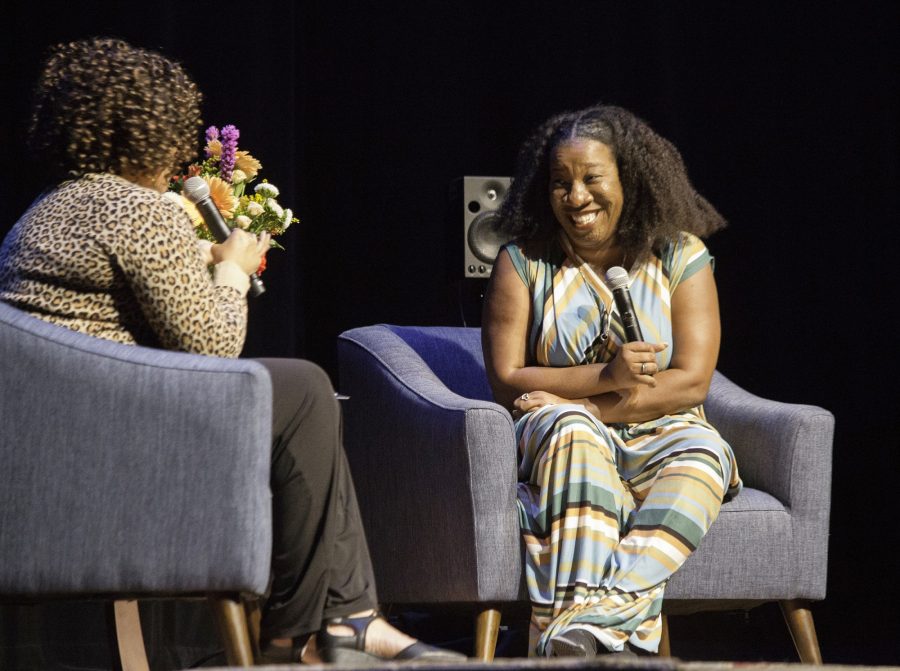Tarana Burke didn’t mean for “Me Too” to become a viral hashtag, let alone become the face of an entire cultural movement for survivors of sexual violence. The activist and social justice servant first introduced her efforts to the internet in 2006 via MySpace. From there, it floated around, supporting those who crossed paths with the slogan and Burke’s work until Oct. 15, 2017. Actress Alyssa Milano used the slogan without knowledge of its origins in a tweet regarding sexual violence within the entertainment industry, specifically referring to the then-recent news about victimizer and producer Harvey Weinstein. From there, “Me Too” was turned into a hashtag that flooded the web and connected survivors worldwide.
Burke graced the University of Arizona with her presence and wisdom earlier this semester at our very own Centennial Hall. Thanks to the Consortium of Gender-Based Violence, the Tucson community was able to hear her explicate the background of the movement, her thoughts on the new generation of activists, the romanticization of movements and self-preservation for survivors.
The chat began with clarifying rundown of the emergence of #MeToo as a viral development. Burke had been working with Girls For Gender Equity in Brooklyn, N.Y., where her work focused on ensuring that her colleagues were culturally confident and aware of the kind of people and environment they were dealing with.
RELATED: OPINION: What are we trying to accomplish with cancel culture?
Her projects concentrated on childhood sexual abuse and how to recognize trauma, especially when distinguishing the differences in signs of trauma in white girls and black girls. This was important in recognizing tells of trauma and altering approaches situationally. Burke has been doing this work her whole life; #MeToo began on a t-shirt, and she realized the world needed to understand the work she and her colleagues had been doing and needed to get communities of color to talk about sexual abuse.
After Milano unknowingly used the pre-established slogan, she reached out to Burke personally to apologize and ask what she could do to help. This led to an influx of celebrity involvement with actresses such as Gabrielle Union and Michelle Williams extending themselves in support of Burke and the cause. The gracious movement-maker made sure to emphasize that she does not blame the white actresses that brought #MeToo mass-media attention for accidentally figure-heading themselves to the cause, but rather white media for (yet again) ignoring POC/black efforts unless for white benefit. Although the origins of “Me Too” are rooted by the efforts of black women, it didn’t receive white media attention until famous white women flagged down their attention.
The Q&A seamlessly segued into personal kudos from Burke directed toward the latest generation of politically involved young people. “Young people are pushing back on respectability politics,” Burke gleefully praised. She made sure to include the fact that there is a lot to learn from the older generations and that she hopes our main takeaway is how to do things differently.
RELATED: OPINION: What are our roles as academics?
Although she compliments this generation’s passion and ambition, she made sure to stress that there is a broad misunderstanding of what a movement truly is, especially in regard to organization. Rather than paraphrase, I will let her eloquent words stand on their own.
When asked about organizing and what facets of it are romanticized, Burke giddily answered, “Ha, the whole thing! What I have discovered in these last two years, what has become really clear to me, is that people do not understand movement. And if you don’t understand movement, you definitely don’t understand organizing … If you think a hashtag is going to end sexual violence, you’ve lost your mind. Or, you really don’t understand what movement is or what the hashtag did. What it did was galvanize people around the world. It’s an amazing galvanizing tool, but it is not the movement.”
She went on to say, “I tell people all the time that movements are long, they’re strategic, they’re thoughtful and they include multiples of different people doing multiple things, all working towards the same end. You need to study movement. These people that have built these movements that we are standing on are brilliant. We need to take some of that, shift it around or whatever, but not romanticize it.”
I would like to extend a personal “thank you” to Tarana Burke for taking the time to come to the UA to not only further educate us on sexual violence, but also for offering clarity, words of wisdom, healing and encouragement to our own community’s survivors and activists.
Selena Kuikahi is a junior majoring in film and law









